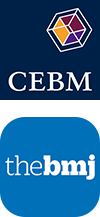



By Peter J Gill
Over two decades has passed since the late David Sackett coined the term evidence-based medicine (EBM) to refer to decision-making that incorporates clinical expertise, best available evidence and patient preferences. The early era of EBM saw the emergence of a cohort of leaders mainly in academia that applied this simple concept to mainstream medicine. These leaders, many of whom are now mid to late-career, include Gordon Guyatt, Sharon Straus, Brian Haynes, Paul Glasziou, Iain Chalmers, among several others. Further, some suggest provocatively that the evidence-based medicine movement is in crisis for various reasons, partly because the agenda has been hijacked by special interests groups. Who will be the voice of evidence-based medicine when these leaders retire, and what does the future hold for evidence-based medicine?
Evidence Live, a joint partnership between the Centre for Evidence-Based Medicine (CEBM) and the BMJ, is the central meeting point for the EBM community. Since inception, Evidence Live has worked tirelessly to include the voice of students, young doctors and early career researchers by soliciting submissions on pertinent questions, offering discounted conference positions, hosting sessions specific for students and publishing top submissions in the Student BMJ. Yet, over the past three Evidence Live conferences, it has become clear that there is a ‘generational gap’ between those individuals whom currently lead the EBM debate with those whom are using EBM everyday, with notable exceptions like Kamal Mahtani and An-Wen Chan.
There are several reasons why this generational gap has emerged. First, given the growing complexity of generating and synthesizing research, it has become prohibitively difficult for all but the very few to participate; most of the low-hanging fruit has been plucked. Second, the upcoming generation of leaders is naïve to the time before evidence-based medicine (‘wild wild west’) and therefore may take it for granted. Third, the current paradigm of evidence-based medicine is framed by the old paradigm; such a structure may inherently inhibit and fail to foster new and potentially revolutionary ideas that challenge status quo. Fourth, training and time commitments limit the opportunity of students to participate in initiatives.
Despite these challenges, notable examples of younger leaders have emerged. For example, the Students 4 Best Evidence website was launched in 2013, supported by Cochrane UK, to bring together students interested in evidence-based healthcare. The website provides an opportunity for students to read and write about EBM. Another example builds on the success of the Choosing Wisely campaign in North America. A group of Canadian medical student leaders recently met to brainstorm ways to reduce unnecessary tests and treatments. By asking provocative questions, certain professors are now routinely included Choosing Wisely recommendations in lecture slides.
But more is needed. In order to safeguard evidence-based medicine for the next twenty years, it is imperative to foster the development of young leaders, including students, academics, entrepreneurs, clinicians, economists, political scientists, sociologists, journalists, patients, analysts, accountants, and others. For the past 20 years, the CEBM in Oxford has played a crucial role in disseminating EBM globally through teaching workshops, research projects and advocacy. In particular, beyond teaching courses both in Oxford and globally, CEBM oversees an entire MSc and DPhil program in Evidence-Based Health Care. The launch of the Evidence Live conference series has provided a broader venue on which the principles and issues in evidence-based medicine can be debated and discussed, and has proven to be a major success.
One theme of Evidence Live 2016 is titled ‘Training the Next Generation of Leaders in Applied Evidence’ and aims to address these challenges. But we want to identify young leaders in EBM, and to assist these individuals in becoming future leaders in healthcare. At Evidence Live 2016, we will be hosting a first ever workshop for Young Leaders in Evidence-Based Medicine. This networking event will bring together young leaders and discuss mentorship, career trajectories, advice from successful young professionals, and much more. The workshop will be the first of many, and in time, may evolve into an entire pre-conference workshop or leadership program.
For EBM to continue to inform practice, it must be salient to those on the front-line, those who will be taking over the helm of decision-making in the next two decade. The debate about its future should include these thinkers. We hope that early identification and subsequent mentorship will increase the likelihood that these individuals will pursue careers focused on leadership, and become the face of evidence-based medicine.
But for this initiative to be successful, we need young leaders to attend! Evidence Live 2016 is offering 5 free places for the top 5 articles submitted which will be published in the Student BMJ. There are also 50 positions for young leaders at a reduced rate of £155. And this workshop is open for all, not just clinicians and researchers; we want economists, political scientists, sociologists, journalists, patients, etc. Register online before Evidence Live 2016 sells out!
—
This blog was written by Peter J Gill, member of the Evidence Live 2016 Steering Committee, paediatric resident at the Hospital for Sick Children at the University of Toronto and an Honorary Fellow at the Centre for Evidence-Based Medicine.